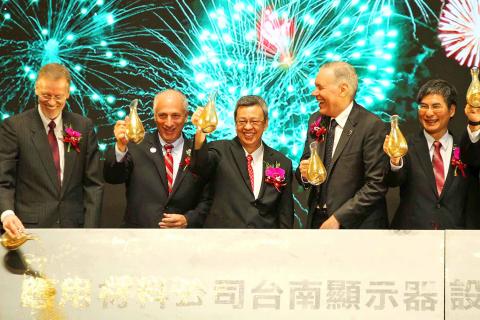Applied Materials Inc, a leading US semiconductor equipment supplier, yesterday launched its first combined display manufacturing center and laboratory at Tainan’s Southern Taiwan Science Park (南部科學工業園區).
The Santa Clara, California-based company has invested more than NT$3 billion (US$95.57 million) in its new plant, which takes up about 5.1 hectares, or seven football fields, and includes two cleanrooms and a laboratory.
The company plans to manufacture 10th-generation LCD production equipment on a large scale at the plant, as well as and organic LED (OLED) equipment, according to the Ministry of Economic Affairs’ Web site.

Photo: CNA
Applied Materials’ new plant in Tainan is expected to boost local investment in the precision machinery and special materials industries, Vice Minister of Economic Affairs Wang Mei-hua (王美花) said.
Vice President Chen Chien-jen (陳建仁), who presided over the ceremony, said that as tensions rise between the US and China, more Taiwanese and foreign companies with production sites in China are looking to relocate to Taiwan, according to a ministry statement.
Taiwanese firms have pledged to invest more than NT$300 billion in Taiwan, creating 30,000 job opportunities, the ministry said.
Chinese-language TechNews quoted American Institute in Taiwan Director Brent Christensen, who also attended the ceremony, as saying that companies would be more willing to invest in Taiwan as intellectual property is well protected by the nation’s laws, unlike in China

Taiwan Semiconductor Manufacturing Co (TSMC, 台積電) secured a record 70.2 percent share of the global foundry business in the second quarter, up from 67.6 percent the previous quarter, and continued widening its lead over second-placed Samsung Electronics Co, TrendForce Corp (集邦科技) said on Monday. TSMC posted US$30.24 billion in sales in the April-to-June period, up 18.5 percent from the previous quarter, driven by major smartphone customers entering their ramp-up cycle and robust demand for artificial intelligence chips, laptops and PCs, which boosted wafer shipments and average selling prices, TrendForce said in a report. Samsung’s sales also grew in the second quarter, up

On Tuesday, US President Donald Trump weighed in on a pressing national issue: The rebranding of a restaurant chain. Last week, Cracker Barrel, a Tennessee company whose nationwide locations lean heavily on a cozy, old-timey aesthetic — “rocking chairs on the porch, a warm fire in the hearth, peg games on the table” — announced it was updating its logo. Uncle Herschel, the man who once appeared next to the letters with a barrel, was gone. It sparked ire on the right, with Donald Trump Jr leading a charge against the rebranding: “WTF is wrong with Cracker Barrel?!” Later, Trump Sr weighed

LIMITED IMPACT: Investor confidence was likely sustained by its relatively small exposure to the Chinese market, as only less advanced chips are made in Nanjing Taiwan Semiconductor Manufacturing Co (TSMC, 台積電) saw its stock price close steady yesterday in a sign that the loss of the validated end user (VEU) status for its Nanjing, China, fab should have a mild impact on the world’s biggest contract chipmaker financially and technologically. Media reports about the waiver loss sent TSMC down 1.29 percent during the early trading session yesterday, but the stock soon regained strength and ended at NT$1,160, unchanged from Tuesday. Investors’ confidence in TSMC was likely built on its relatively small exposure to the Chinese market, as Chinese customers contributed about 9 percent to TSMC’s revenue last

LOOPHOLES: The move is to end a break that was aiding foreign producers without any similar benefit for US manufacturers, the US Department of Commerce said US President Donald Trump’s administration would make it harder for Samsung Electronics Co and SK Hynix Inc to ship critical equipment to their chipmaking operations in China, dealing a potential blow to the companies’ production in the world’s largest semiconductor market. The US Department of Commerce in a notice published on Friday said that it was revoking waivers for Samsung and SK Hynix to use US technologies in their Chinese operations. The companies had been operating in China under regulations that allow them to import chipmaking equipment without applying for a new license each time. The move would revise what is known